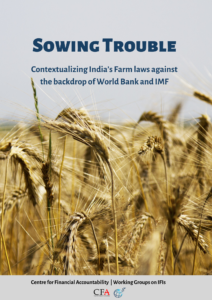 This booklet is a result of webinars under the World Without World Bank campaign that brings together activists, academicians and other civil society groups to protest, respond to the World Bank’s neoliberal reforms. In 2020, the Working Group on International Financial Institutions started this campaign during the World Bank Spring Annual General meetings where similar institutions laud themselves for the achievement of doling out billions of dollars for supporting economies through the pandemic and will set the course of direction for ‘recovery’. The idea behind this campaign was to counter and expose the narrative that the Bank keeps pushing behind with no intent of inclusive and sustainable support for countries and people battling marginalization. These meetings happen twice a year attended by an entourage of self-applauding stakeholders.
This booklet is a result of webinars under the World Without World Bank campaign that brings together activists, academicians and other civil society groups to protest, respond to the World Bank’s neoliberal reforms. In 2020, the Working Group on International Financial Institutions started this campaign during the World Bank Spring Annual General meetings where similar institutions laud themselves for the achievement of doling out billions of dollars for supporting economies through the pandemic and will set the course of direction for ‘recovery’. The idea behind this campaign was to counter and expose the narrative that the Bank keeps pushing behind with no intent of inclusive and sustainable support for countries and people battling marginalization. These meetings happen twice a year attended by an entourage of self-applauding stakeholders.
Despite the pandemic and rather using the pandemic as an opportunity, the World Bank and IMF have continued their support for neoliberal reforms through development policy loans for the pandemic support. Last year, the Bank pushed for privatization of the banking sector, provided support for the new farm laws, agricultural reforms, electricity reforms, privatization, of course, of sea, rivers, the push for reforms in the health and education sector. The World Bank continues to grow its influence in India and through state partnerships impacting local governance structures, they continue to venture into new and what seemed to be more lucrative territories with the approach of maximizing finance for development, building connections with private financial entities, making finance more complex and more difficult to trace.
Under the banner of ‘World Without World Bank’, numerous civil society organizations in India come together to try and expose the bank for what it really is from what it claims to be and to understand the wide-ranging impacts of World Bank financing on India’s political economy. The idea is to make international finance an anchor to some of these debates and make people’s voices heard.
Often it is easy to formulate policy recommendations that are neat on paper, present technocratic solutions to very nuanced problems that plague Indian agriculture. However, in a country where most farmers fall off the grid in definitional enquiry, the need to go multiple steps ahead is even more imminent. These contentious farm bills are about agricultural markets and agricultural supply chains and about tone-deaf solutionism. Through these edited transcripts, we hope that our readers get a sense of the various issues and perspectives that remain important to the understanding of the larger debates around the farm bill.
Read and download the full report here: Sowing Trouble Contextualizing India’s Farm laws against the backdrop of World Bank and IMF 1
Centre for Financial Accountability is now on Telegram. Click here to join our Telegram channel and stay tuned to the latest updates and insights on the economy and finance.
